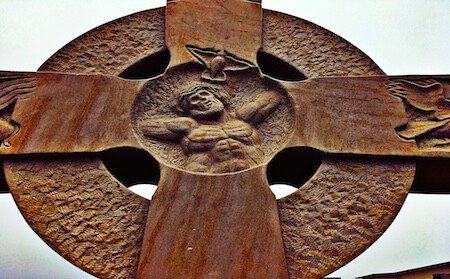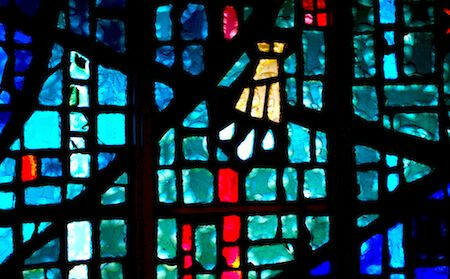Theology Matters: Importance of Jesus' Suffering and Death

“What is the great importance of Jesus’ suffering and death?” Another way to formulate this question is to ask, “Why did Jesus have to suffer and die the way he did?”
For two thousand years the mystery of the cross has occupied the thinking of the greatest Christians: St. Peter, St. Paul, Ignatius of Antioch, Justin Martyr, Gregory of Nyssa, Augustine, Thomas Aquinas, Catherine of Siena, Julian of Norwich, Teresa of Avila, Martin Luther, John Calvin, Richard Hooker…you get the point. There are a lot of them.
So, “Why the Cross?” Why did Jesus suffer and die in the most excruciating and humiliating way possible? Well, here’s one way to get at the question.
- S. Lewis rightly points out that this world is enemy-occupied territory and the Christian story is all about how the world’s rightful king has slipped clandestinely behind enemy lines. Jesus, of course, is that rightful king. He is God in the flesh, and he is calling all of his followers to “take part in a great campaign of sabotage” (Mere Christianity). I like the militaristic imagery that Lewis uses because it illustrates both what the Jews were looking for in their Messiah, and who Jesus really is.
The Jews believed that when the Messiah arrived he’d regroup the scattered tribes of Israel, getting them into good fighting condition, and then mount a victorious military campaign against Israel’s enemies—namely the Romans. Well, Jesus does regroup the scattered tribes, albeit in a symbolic way. He gathers twelve disciples around himself. And he says and does things to get his followers into good fighting condition. He does this not by teaching them guerilla warfare or hand to hand combat, but by teaching them how to do spiritual warfare. He gives them authority over the devil (Matthew 10:1; Luke 9:1,10:17). He not only teaches his followers spiritual warfare, he also leads them into battle. Jesus has come into the world to destroy the works of the devil (1 John 3:8b).
For the most part the Jews missed it. They didn’t recognize their Messiah when he came. But the devil didn’t miss his arrival. He recognized him. Almost as soon as the king has landed the enemy goes on the march against him.
Remember that peach of a man named Herod? When he gets word from wise men that there’s been a “child born king of the Jews,” he’s frightened, “and all Jerusalem [is frightened] with him,” says St. Matthew. (Let the reader understand.) Herod is the king and he’s not about to let a little child upset his gig. So he goes after Jesus, but fails to cut him down. However, he slaughters many innocent children in the attempt (Matthew 2:1-18). Like I said, “Great guy.”
The combat resumes after Jesus’ baptism. The devil goes out to meet him in the wilderness. He’s clever with his timing too. He meets Jesus after he’s fasted forty days and nights. Jesus is famished. How would you like to meet the devil when you’re exhausted? I wouldn’t want to meet him if I were well rested. Anyway, the enemy comes at Jesus with one cunning temptation after another, but he successfully resists, and the devil leaves him—for the time being (Matthew 4).
Then Jesus enters public ministry. From the beginning he’s opposed. Of course, there are those who cheer him, but they grow fewer and fewer as his mission unfolds. Jesus goes to his hometown. Time to celebrate the boy-made-good, right? Hardly. They take offense at him. In return, Jesus is amazed at their unbelief and his ministry among them is hindered because of it (Matthew 13: 54-58). Ultimately, Jesus is a man with real authority, which threatens the Pharisees, and so they plot to kill him (Matthew 12:14).
By the time we reach the Passion narrative(s), all the evil forces, seemingly every form of human sin and dysfunction, come out to meet Jesus. Judas, one of the twelve, betrays him. The other disciples fall asleep in his greatest hour of need. Peter denies even knowing him. The Sanhedrin, meant to be a dispenser of justice, carries out an act of great injustice. Pontius Pilate knows the truth, but he refuses to follow through on it. The temple and Roman guards, full of blood lust, unleash on him a grotesque beating. Finally, as this innocent man hangs naked, nailed to a stake of wood, there’s the crowd standing by to mock him (Matthew 27).
“By his own goodness and perfection, Jesus draws out the ugliness of human sin” (Bishop Robert Barron). It’s a bleak picture of the human race, isn’t it? And please don’t start with any nonsense that you’re the one exception. Friend, be honest with yourself. I mean really honest with yourself. You’ve supped with the devil. We all have. We’ve all crucified this innocent man.
Jesus is crushed by the evil of the world. He dies. He’s buried.
If that’s the end of the story, the answer to “What is the great importance of Jesus’ suffering and death?” is “It’s of no importance whatsoever” (1 Corinthians 15:13-19). But thanks be to God it’s not the end of the story! In the resurrection, Jesus conquers evil with God’s love. When he returns to those who had abandoned him, he speaks peace, shalom, to them (John 20:19). Through Jesus’ death and resurrection, God has swallowed up all human sin. The cross of Jesus shows us our sin. “The author of life came, and you killed him,” says St. Peter (Acts 3:15). But in the resurrection of Jesus, God conquers the sin of the world with his infinitely greater hesed, i.e. loving-kindness and tender mercy.
What is the great importance of Jesus’ suffering and death? We’re saved because of it. The cross saves us because Jesus becomes “sin for us” (2 Corinthians 5:21). He absorbs sin into himself, and by his resurrection God has canceled the debt of sin.
“We adore you, O Christ, and we bless You, because by Your holy cross, You have redeemed the world” (Stations of the Cross). Amen.



